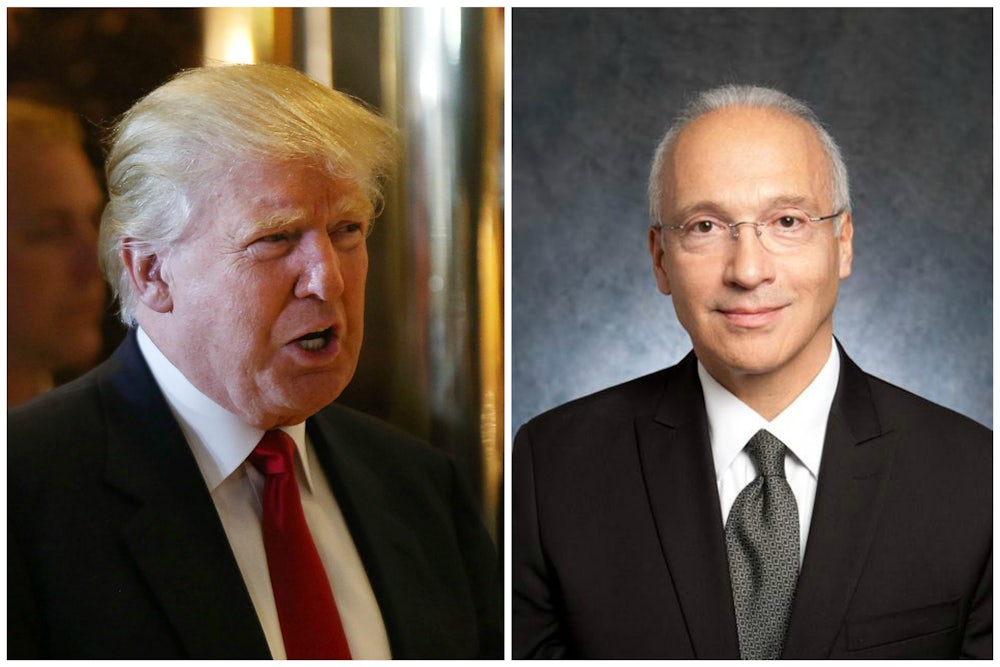Donald Trump has repeatedly argued that Judge Gonzalo Curiel has been unfair to him in the Trump University lawsuit and should recuse himself from the case. The presumptive Republican presidential nominee claims that Curiel’s Mexican heritage and his membership in the San Diego La Raza Lawyers Association creates an “inherent conflict of interest” because, as Trump put it in an interview with CNN, “I am building a wall.” But even Trump’s own lawyers appear to know better.
Trump has a simple remedy for this alleged conflict of interest, but he has not invoked it. He could direct his attorneys to file a disqualification motion pursuant to the United States Judiciary Code, on the ground that Curiel’s “impartiality might reasonably be questioned.” Given how strongly Trump feels about the situation—he has even called for an investigation of Curiel—why haven’t his lawyers already taken the necessary steps to disqualify the judge?
The Federal Rules of Civil Procedure require lawyers to certify that their motions are “warranted by existing law or by a nonfrivolous argument for extending, modifying, or reversing existing law or for establishing new law.” The “existing law” could not be more clear that a judge’s background provides no legal basis for seeking disqualification. There is a long line of precedents applying this principle to African-American, Jewish, female, Catholic, Mormon, and gay judges. Any lawyer who brought a motion on similarly spurious grounds—or who tried to argue for changing the law to allow ethnicity-based disqualification—would be subject to sanctions including monetary penalties, censure, and even referral to the disciplinary authorities.
If Curiel, who was born in Indiana to Mexican immigrants, betrayed a racially motivated bias in his comments from the bench or in written orders, it would be a different story. But the most Trump has offered on that score is that Curiel has issued rulings that denied Trump’s motions to dismiss the case—hardly the appearance of bias that the law demands.
Trump’s lead counsel in the case is Daniel Petrocelli, who is the chair of the Trial Practice Committee at the megafirm O’Melveny and Myers, which is headquartered in Los Angeles and has 800 lawyers in offices around the world. Petrocelli is one of the most highly regarded trial lawyers in the United States, with an outstanding reputation for both ability and integrity. It is all but unimaginable that he would risk his reputation—and his firm’s—by bringing such a patently frivolous motion.
Could Trump order Petrocelli to move for Curiel’s disqualification? After all, Trump is a valuable fee-paying client, and lawyers are generally required to follow their client’s instructions. There is an exception, however, when clients make unreasonable demands. Under the California Rules of Professional Conduct, a lawyer may not “seek, accept, or continue employment” where the client’s objective is to “present a claim in litigation that is not warranted under existing law, unless it can be supported by a good faith argument for extension, modification, or reversal of such existing law.”
In other words, Petrocelli would have to withdraw as counsel if Trump were to insist on asserting his charges against Curiel in court rather than on television.
Because of attorney-client confidentiality, we have no way of knowing whether Trump and his lawyers have discussed the possibility of bringing a disqualification motion in the case. But we can be all but certain that Daniel Petrocelli would refuse if asked. That would leave Trump with only two choices. He could continue to suffer the public embarrassment of accepting a judge whose impartiality he has challenged, or he could fire his lawyers and hire new ones.
